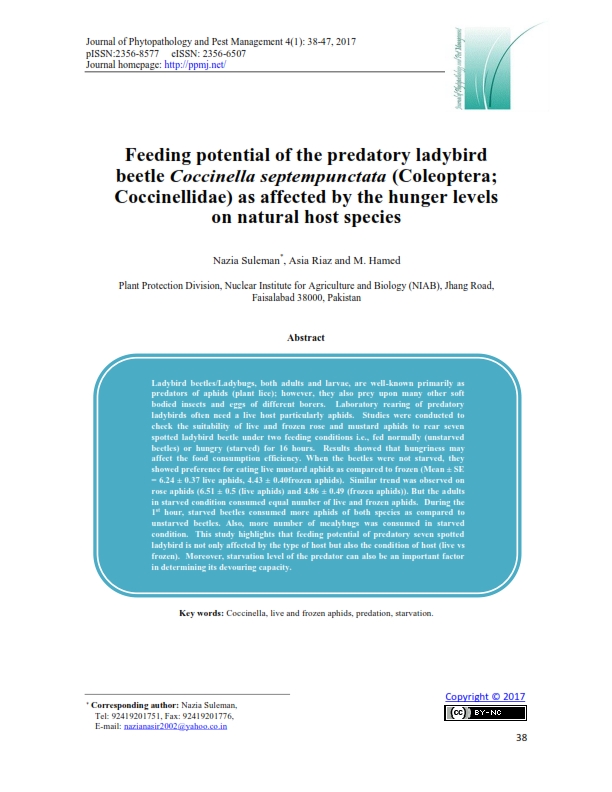Feeding potential of the predatory ladybird beetle Coccinella septempunctata (Coleoptera; Coccinellidae) as affected by the hunger levels on natural host species
Keywords:
Coccinella, live and frozen aphids, predation, starvation.Abstract
Ladybird beetles/Ladybugs, both adults and larvae, are well-known primarily as predators of aphids (plant lice); however, they also prey upon many other soft bodied insects and eggs of different borers. Laboratory rearing of predatory ladybirds often need a live host particularly aphids. Studies were conducted to check the suitability of live and frozen rose and mustard aphids to rear seven spotted ladybird beetle under two feeding conditions i.e., fed normally (unstarved beetles) or hungry (starved) for 16 hours. Results showed that hungriness may affect the food consumption efficiency. When the beetles were not starved, they showed preference for eating live mustard aphids as compared to frozen (Mean ± SE = 6.24 ± 0.37 live aphids, 4.43 ± 0.40frozen aphids). Similar trend was observed on rose aphids (6.51 ± 0.5 (live aphids) and 4.86 ± 0.49 (frozen aphids)). But the adults in starved condition consumed equal number of live and frozen aphids. During the 1st hour, starved beetles consumed more aphids of both species as compared to unstarved beetles. Also, more number of mealybugs was consumed in starved condition. This study highlights that feeding potential of predatory seven spotted ladybird is not only affected by the type of host but also the condition of host (live vs frozen). Moreover, starvation level of the predator can also be an important factor in determining its devouring capacity.Â
Metrics

Published
How to Cite
Issue
Section
License
Authors who publish with Journal of Phytopathology and Disease Management agree to the following terms:
- Authors retain copyright and grant the journal right of first publication with the work simultaneously licensed under a Creative Commons Attribution License that allows others to share the work with an acknowledgement of the work's authorship and initial publication in this journal.
- Authors retain copyright and grant the journal right of first publication with the work simultaneously licensed under the Creative Commons Attribution-Non Commercial License (CC BY-NC). This allows others to share the work with an acknowledgement of the work's authorship and initial publication in this journal.
- Archives of Agricultural Sciences Journal is an Open Access Journal, and articles published are distributed under the terms of the Creative Commons Attribution-Non Commercial License (CC BY-NC). Readers may copy, distribute, and display the work for non commercial purposes with the proper citation of the original work. However, the journal retains the right to exploit subsidiary rights on behalf of the authors.
- Authors are able to enter into separate, additional contractural arrangements for the non-exclusive distribution of the journal's published version of the work (e.g. post it to an institutional repository or publish it in a book), with an acknowledgement of its initial publication in this journal.
- Authors are permitted and encouraged to post their work online (e.g., in institutional repositories or on their website) prior to and during the submission process with full disclosure to the journal, as it can lead to productive exchanges, as well as earlier and greater citation of published work. Following publication in Archives of Agricultural Sciences Journal, the author should update the repository, and include a citation and link to the published work.
Click here for more information on Licensing policy
.png)




